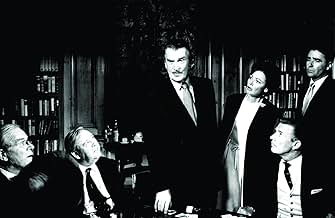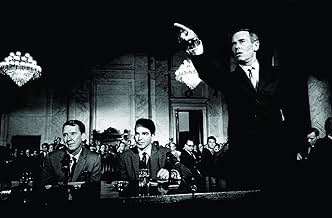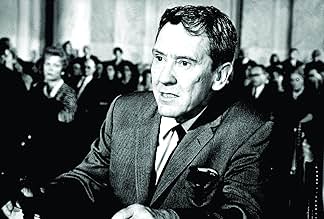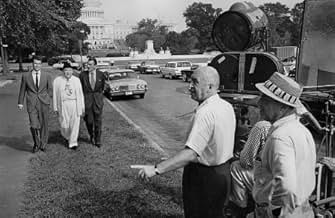Als der US-Senat einen für den Posten des Außenministers vorgeschlagenen Kandidaten überprüft, kommt ein Geheimnis aus der Vergangenheit ans Licht, das nicht nur den Kandidaten, sondern auch... Alles lesenAls der US-Senat einen für den Posten des Außenministers vorgeschlagenen Kandidaten überprüft, kommt ein Geheimnis aus der Vergangenheit ans Licht, das nicht nur den Kandidaten, sondern auch den Ruf des Präsidenten ruinieren kann.Als der US-Senat einen für den Posten des Außenministers vorgeschlagenen Kandidaten überprüft, kommt ein Geheimnis aus der Vergangenheit ans Licht, das nicht nur den Kandidaten, sondern auch den Ruf des Präsidenten ruinieren kann.
- Nominiert für 1 BAFTA Award
- 1 Gewinn & 2 Nominierungen insgesamt
Empfohlene Bewertungen
The premise, the nomination of a controversial new Secretary of State, and the actions of the President and Congress to help or hinder his approval, is still a remarkably timely issue, over forty years later, and it is surprising how little things have actually changed. With Henry Fonda as the nominee, you'd expect that he'd be the 'good guy' of the tale, but when he lies under oath (even for the best of reasons), Preminger makes it clear that in politics, as in life, there is little that can easily be divided into 'black' and 'white'.
Certainly, there are recognizable historic figures in the cast, under different names. The most obvious is skirt-chasing Sen. Lafe Smith, a thinly-disguised JFK, himself, who cut quite a social path prior to marrying Jackie (and afterward, too, as the years have revealed). That his real-life brother-in-law, Peter Lawford, plays the role, is a grand piece of 'tongue-in-cheek' casting (as is Gene Tierney, one of Kennedy's early 'conquests', as a Washington social maven). One character has become even more fascinating, since the film's release; wily South Carolina Sen. Seabright Cooley (a brilliant Charles Laughton, in his final role), was said to have been based on Illinois' legendary Everett Dirksen, but in a real-life parallel, South Carolina produced a 'real' Sea Cooley, in the amazing Strom Thurmond! The 'Who-Is-Who?' aspect aside, the film is populated with many fascinating characters, from wise and sympathetic Senate Majority Leader Robert Munson (Walter Pigeon, in one of his finest later roles), and his 'right-hand man', Senate Majority Whip Stanley Danta (Paul Ford, also wonderful), to the Minority opposition, headed by the perfectly-cast Will Geer. Women, who were finally achieving greater political status, aren't as well-conceived in the film, but are present, with Betty White(!) in a small but visible role.
The key 'players' of the drama, however, are the wily, dying President (screen veteran Franchot Tone, in a terrific 'comeback' role), the enigmatic Vice President (Lew Ayres, another screen legend making a 'comeback'), young, idealistic Sen. Brigham Anderson (Don Murray, who nearly steals the film in his tragic portrayal), and opportunistic Sen. Fred Van Ackerman (George Grizzard, as easily the film's most hiss-able villain!) As with all Preminger films, there is an element of controversy in the story, with homosexuality as the issue addressed. While later film historians have complained that the director fell back into an almost caricatured approach to the gay lifestyle, considering the era the film was produced, and the censorship restrictions of the time, to even mention it was a courageous move, and that Preminger kept this key plot element in the story should be applauded.
"Advise and Consent" may not be the kind of film that will appeal to everyone, but each time I hear Jerry Fielding's stirring opening theme, I find myself drawn back into this ever-fascinating world of Politics and Power, and I think, if you give it a chance, you'll be hooked by it, too! This one is a keeper!
The movie version (more so than the novel) is as much or more about the practicalities of politics than it is about ideology. Some of the political issues themselves were hotly debated topics in the movie's own era, and a couple of them are still topical now, but even they are often secondary to the harsh and often unseemly realities of political power. All of the major characters have their flaws and make mistakes, yet all but a couple of them have some worthwhile characteristics. On its best level, the story is not about winning and losing so much as it is about the ways that political battles affect individual lives and personal character.
There are numerous good performances and some fine casting. Charles Laughton personifies the old-time Senator Cooley, Walter Pigeon (the spell-checker refuses to accept it spelled properly) could not have been better chosen as the Majority Leader, and Henry Fonda is perfect in a challenging role that calls for him to maintain a difficult balance. Even most of the supporting roles are filled well by fine actors like Lew Ayres, Franchot Tone, and Burgess Meredith (who uses his brief screen time very effectively, in a role that must have been quite ironic for him personally).
Naturally, some of the characters and events from the novel had to be omitted or streamlined, but there is still plenty of meat left, even once you discount the Cold War era ideological issues. The personal lives and personal agendas of the characters, the tension between their lives as individuals and their responsibilities as public servants, and the contrast between what they do and what the public sees, all give the movie some extra depth that makes it worthwhile and that gives it meaning that goes well beyond the political issues on the surface.
It was also a book that Hollywood could not film under the film industry's notorious Production Code. As it happened, the book fell into the hands of director Otto Preminger, long-time foe of Hollywood's rules for self-censorship. He not only made the film, he flagrantly broke the code; as such, ADVISE AND CONSENT presents our nation's leaders embroiled in a blackmail plot, finds actress Gene Tierney using the word 'bitch,' and became the first Hollywood film to show a gay bar. It was shocking stuff for 1962.
The story is extremely convoluted. An aging and extremely ill President makes a highly controversial nomination for Secretary of State---which is opposed by a member of his own party, who bears the nominee a personal grudge and who attempts to derail the nomination by accusing the nominee of former membership in the Communist Party. This in turn touches off a vicious battle between those in the party who support the nominee and those who don't, a battle that will ultimately result in the suicide of the only character who has the integrity we would like to see in our political leaders.
The cast is indeed remarkable and, from Lew Ayres to Betty White, plays with considerable conviction and tremendous restraint. Henry Fonda is often cited as the star of the film, but in truth he appears in the small but pivotal role of Robert Leffingwell, nominee for Secretary of State. Screen time is divided between Walter Pigeon as the Majority Leader, Charles Laughton as the senator who opposes the nomination, and Don Murray, an idealist who finds himself chairing the nomination committee. All three play extremely well, but it is really Laughton---in his final screen role---who walks off with the film as the devious and openly vicious Senator from South Carolina. The trio is ably supported by a dream cast that includes Franchot Tone as the President, Lew Ayres as the Vice President, George Grizzard as a growling ideologue, Gene Tierney as a society hostess---and yes, Betty White, who offers a brief turn as the Senator from Kansas.
It has become fashionable to dismiss Otto Preminger films of the 1950s and 1960s as ponderous, all-star, and pseudo-intellectual trash, and indeed it is difficult to find much positive to say about films like EXODUS and HURRY SUNDOWN these days. But Preminger is in many ways under-rated; his films have not always dated well in terms of subject, but they hold up extremely well in the way in which they are put together, with ADVISE AND CONSENT a case in point---and it is worth pointing out that accusations of leftism, adultery, and homosexuality are still enough to prompt everything from impeachment to congressional hearings to resignations. Nor has the process of the political dance itself changed greatly between then and now.
The great flaw of the film is its conclusion, which seems facile to the point of being hokey---but this is also the great flaw of the novel, which ends in much the same way--and at times ADVISE AND CONSENT seems more than a little dry. All the same, it remains a movie worth watching, particularly notable for its performances, fluid camera work, and meticulous recreation of party politics. The DVD offers a near-pristine widescreen transfer with good sound quality and an interesting, if occasionally too academic, commentary by film historian Drew Casper. Recommended.
GFT, Amazon Reviewer
Wusstest du schon
- WissenswertesDirector Otto Preminger offered the role of a Southern senator to Martin Luther King Jr., believing that the casting could have a positive impact (despite the fact that there were no black senators at the time). King declined after serious consideration, as he felt playing the role could cause hostility and hurt the civil rights movement.
- PatzerWhen the roll call vote is being conducted on the motion to advise and consent to Leffingwell's nomination, Senator Van Ackerman's name is not called. Even though he had left the Senate Chamber, the clerk would still have called his name.
- Zitate
Johnny Leffingwell: The phone - Senator Munson.
Robert Leffingwell: Tell him I've gone out.
Johnny Leffingwell: Why?
Robert Leffingwell: Because, Johnny, he'll want to do some things that might obligate me.
Johnny Leffingwell: I mean why do you want me to lie? If you're in, you're in; if you're out, you're out.
Robert Leffingwell: Son, this is a Washington, D.C. kind of lie. It's when the other person knows you're lying, and also knows you *know* he knows. You follow?
- Alternative VersionenAlso available in a computer colorized version.
- VerbindungenFeatured in Henry Fonda: The Man and His Movies (1982)
- SoundtracksThe Song from Advise and Consent
Music by Jerry Fielding
Lyrics by Ned Washington
Sung Frank Sinatra - voice on juke box
Top-Auswahl
Details
- Erscheinungsdatum
- Herkunftsland
- Offizieller Standort
- Sprache
- Auch bekannt als
- Advise & Consent
- Drehorte
- Columbia/Sunset Gower Studios - 1438 N. Gower Street, Hollywood, Los Angeles, Kalifornien, USA(Studio, Senate Chamber - interiors)
- Produktionsfirmen
- Weitere beteiligte Unternehmen bei IMDbPro anzeigen
- Laufzeit
- 2 Std. 19 Min.(139 min)
- Farbe
- Seitenverhältnis
- 2.35 : 1






































